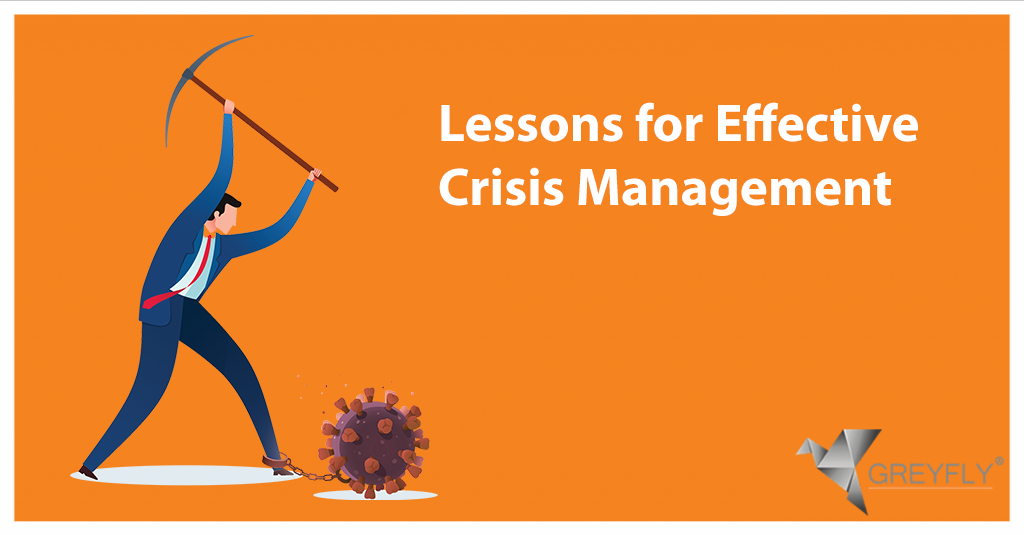- March 30, 2020
- Posted by: Sang Le
- Categories: A.I., Business plans

As we find ourselves encroaching further into a society-wide crisis in which we are all inextricably drawn and linked as individuals, families and organisations, I felt that, whether your company finds itself in this crisis or not, now is the time to consider lessons from crisis management.
Remaining competitive is key for business success, and to lose operational capacity due to an act of nature, removes you from the marketplace, either temporarily or forever. I hope that you find the advice provided below informative; the list is not exhaustive. It does however draw on our legacy and current experience of dealing with clients.
Lessons 1: Now is the time to lead
A simple definition of leadership is that it is the art of motivating a group of people to act towards achieving a common goal. When things are going well, it is relatively easy to lead but, it is in a crisis when true leaders shine. A crisis can be a test for even the best of leaders.
Lesson 2: Understand Impacts
A genuine and sensible assessment of the situation will help you find feasible work-around solutions. Once you have understood the crisis, then you can take the necessary steps to repair the damage done and get things back on track. The first step is to identify the likely crisis impacts on operations, projects, finances and ultimately, strategy. Be expedient in understanding these impacts and then consider them from a risk perspective too, so that you can prioritise efforts. Misunderstanding the impacts can seriously harm the effectiveness of your action plans.
Lesson 3: Response Tracker
In crisis times it is imperative to have effective monitoring systems in place. Detection can be linked to both people and process reporting mechanisms. For example, consider asking managers to provide both formal KPI reports and an accompanying free-flow commentary.
Lesson 4: Keep Strategic
During a crisis, being strategically focused means envisaging the bigger picture to make the right decisions on effective management. Consider the vision and business strategy before finalising the prioritised action plan.
Lesson 5: Make Quick Decisions
In these times you need to make your decisions within the shortest length of time. Decisions should be made quickly as there may not be time to conduct a deeper analysis of a problem. However, decision making should be prioritised and be informed as optimally as can be possible during times of crisis. This may involve a reliance on intuition, rather than deep data.
Lesson 6: Operational priorities
Once you understand what might happen, you must then devise a strategy and correlated actions in response so that the business can survive. That means prioritising to include only top-level items in order to achieve that very survival. This means de-prioritising too. For example, some capital investment projects may need to be postponed or even cancelled.
Lesson 7: Respond to Early Warning Signs
You may feel that all warnings are limited to the ‘main event’. However, there may be further early signs of specific impacts. The art therefore is to learn to detect signs; they should not be ignored. Find out exactly if there is the potential of a problem incubating and then take immediate preventive actions.
Lesson 8: Never Run Out of Ideas
The next lesson is to always probe, examine and identify ideas that may help you with the response to the crisis. If you have good and feasible ideas, it should allow you to be flexible and see things from several perspectives. Even in challenging times, ideas can be corralled and can incorporate creativity in order to maintain enthusiasm, by inviting input from a variety of perspectives.
Lesson 9: Encourage Others in Problem Solving
When a crisis is manifest, it is good practice to bring in others to engage with problem solving-teams. This could even be a reliable business partner who could propose possible ways of solving the problem. Again, group validation of ideas can help to air and discuss alternatives and generate solutions. It is valuable if stakeholders are open with you and they feel free to express all alternatives in solving the problems caused by the crisis.
Lesson 10: Manage Communications
Communication to both internal staff, suppliers and clients is critical during the time of a crisis. We have found that ‘keeping in touch’ brings unforeseen benefits and keeps the lines of wider support active and flowing. In this manner there is a greater propensity for reciprocally beneficial solutions to be found. Communications can take many forms from verbal, written to public. In every case it is imperative that all communications are carefully managed.
Lesson 11: Don’t Panic
In the face of disaster, emotions can come to the fore. However, to lead, with even greater intensity and direction, it is best to keep a cool head and remain positive. Teams and colleagues are naturally drawn by guidance and moral support; show you are concerned, yet calm, focused and collected is the optimum policy. Panic can sow a further impression of disaster and only exacerbates an already stressful time.
Lesson 12: Find the Silver Lining
Some years ago, I remember a professor waving around his newly published book which focused on both opportunity and risk – even today I value that recollection and the ideas that my professor provided that now have an even more palpable relevance in these times. As an optimist I always look to find the realistic silver lining that can be achieved. It may not rescue the whole situation, but perhaps it can make that essential difference between having a future or merely dwindling perspectives and dusk. I believe that the former is both preferable and achievable with good sense and equally good heads, held up and out of the proverbial sand.
So, some lessons to digest.
The crisis will pass, and once normality prevails you will undoubtedly be more prepared with the lessons garnered from the moment we live in now. And hopefully the next challenge will be less severe, and you will be better equipped to deal with it.
About Greyfly
Greyfly have experience in successfully delivering full life-cycle, benefits led, multi-million pound transformation projects and are the preferred suppliers to the BBC for programme management. Our underlying passion is to apply AI to project management to improve delivery, tackle the real project delivery problem and make cost savings for our clients.
